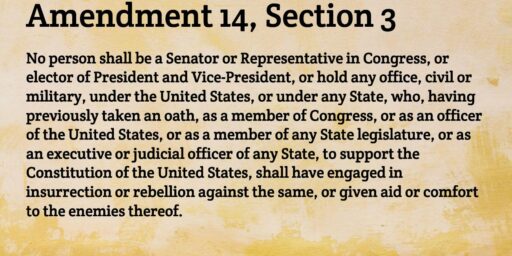Then Veto the Bill (Signing Statements)
Via Jake Tapper at ABC: President Obama Issues “Signing Statement” Indicating He Won’t Abide by Provision in Budget Bill
Last week the White House and congressional Democrats and Republicans were involved in intense negotiations over not only the size of the budget for the remainder of the FY2011 budget, and spending cuts within that budget, but also several GOP “riders,” or policy provisions attached to the bill.
One rider – Section 2262 — de-funds certain White House adviser positions – or “czars.” The president in his signing statement declares that he will not abide by it.
“The President has well-established authority to supervise and oversee the executive branch, and to obtain advice in furtherance of this supervisory authority,” he wrote. “The President also has the prerogative to obtain advice that will assist him in carrying out his constitutional responsibilities, and do so not only from executive branch officials and employees outside the White House, but also from advisers within it. Legislative efforts that significantly impede the President’s ability to exercise his supervisory and coordinating authorities or to obtain the views of the appropriate senior advisers violate the separation of powers by undermining the President’s ability to exercise his constitutional responsibilities and take care that the laws be faithfully executed.”
Therefore, the president wrote, “the executive branch will construe section 2262 not to abrogate these Presidential prerogatives.”
No time for a long post on this subject, but I will say the same thing I said when Bush engaged in this type of action: if you can’t abide by the bill you have two constitutional options: sign it and abide by it anyway or veto it.






It’s line-item veto via temper tantrum.
If he won’t obey the law,then he must be removed from office! Or is he the only one to be allowed to flaunt the requirement to live within the boundaries of law.
The third option would be to neither sign nor veto it, and when it becomes effective 10 days later, sue to have the provision overturned as unconstitutional.
Every President who tried this, of course, would lose, because it’s a nonjusticiable political question. So
I think you take this a bit too seriously Steven. The Republicans knew full well that the provision is unconstitutional, and I imagine that they expected Obama to do exactly what he has done. They stuck it in the bill to do yet a little more political theatre – knowing that Obama could not practically veto the entire budget bill over these provisions, but also knowing that they had no standing to regulate his advisory staff..
I love the irony here where the man who foisted Obamacare on us is now complaining about the constitutionality of legislation he signs into law.
Steven, I’m afraid you and Tapper have fallen for a little bit of GOP-orchestrated political theater.
The signing statement reads to me as the President asserting the basic right to receive advice and to delegate authority within the executive branch, and rejecting any precedent the GOP might think it’s setting here. Nowhere does it state that Obama is going to go around Congress’ back somehow to fund these positions, which are already vacant. Tapper’s characterization is highly misleading.
Bush’s third term.
This is precisely why it’s important for congress to challenge the president, even if they are from the same party. The congresses under bush were afraid to say boo to him and now all manner of abhorrent practices have become normalized.
There’s only so much schadenfreude I can really derive from listening to the moans of the wingnutters who supported everything Bush did but howl in indignation when Obama does it. I’d rather just have a well balanced government.
Because they knew Congress’ spending authority wasn’t actually plenary under Art. I, Sec. 8, Clause 1.
Oh, wait…
It’s very confusing. When Bush did it, a signing statement to the effect that a portion of a bill unconstitutionally limited the President’s power was a unconscionable threat to the Republic (“we’re not going to use signing statements as a way of doing an end run around Congress” – Candidate Obama, 2008). But when Obama does it to exercise what amounts to a line-item veto (ruled unconstitutional by the Supreme Court), it’s really the Republicans playing political games. The mind boggles.
We are well aware that your mind is often boggling, and finds the world terribly confusing. But it really isn’t quite that difficult Dodd.
Obama never took a stand against signing statements in general. He objected to the specific manner in which Bush used them. He did not accuse Bush of acting unconstitutionally because he issued signing statements, he accused Bush of abusing the practice, by making spurious arguments that were not, in fact, intended to merely protect legitimate executive functions, but were rather intended to get around legitimate legislative instructions.
And he has made the case here, though its rather an obvious case, that it is the Congress here that is overstepping its bounds.
There is nothing hypocritical about applying the same standard to two different situations and ending up with different conclusions. In fact, a principled application of the same standard to different situations will necessarily yield different conclusions, so long as the differences in the situation are relevant to the application of the standard. As they seem to be here.
Shorter Tano: You’re an idiot. Circumstances change — it’s a Democrat doing it now.
Because, you know, Congress’ plenary spending power doesn’t extend to restricting the use of taxpayer funds for certain purposes. Not if Obama wants to spend them as he sees fit, anyway. It’s totally different so his unambiguous promise is obviously inoperative.
Let’s say in 2012, Obama wins re-election, but the Republicans get veto-proof majorities in both houses (yeah, unlikely, I know. Maybe even impossible in the Senate. But stick with me.)
Could the Congress just vote to defund the entire Executive Branch? Slash all salaries for everybody? Refuse to pay the White House electric bill or the Secret Service?